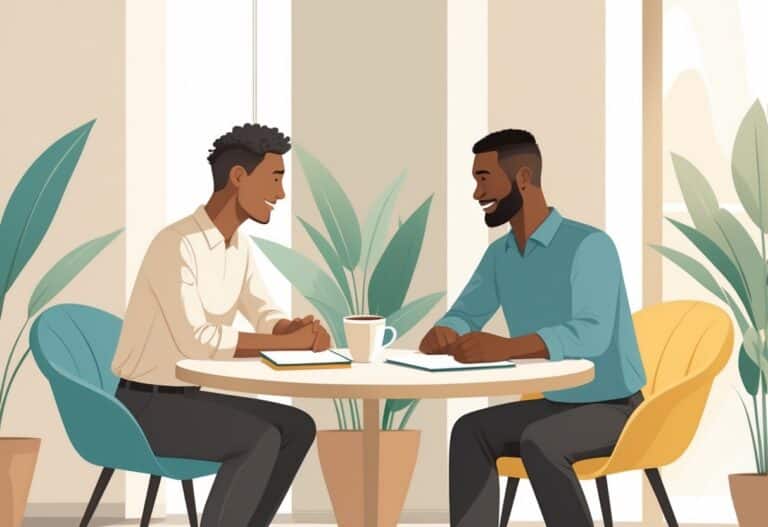Starting a new relationship? It’s a wild mix of excitement and nerves. You want to open up, but there’s always that urge to protect your heart. Trust is the foundation that allows you to be vulnerable and open with your partner while feeling safe and secure.
Building trust in a new relationship takes patience, honest communication, and small, steady actions. Unlike old relationships, you get a fresh start here—a blank canvas to set up healthy trust habits.
Building trust means figuring out what trust actually is, learning how to show you’re trustworthy, and dealing with the inevitable bumps along the road. Whether you’re naturally open or a bit guarded, you can pick up the skills to create a strong connection.
Understanding Trust in Relationships
Trust is what keeps relationships alive or lets them wither. In new relationships, it works differently than it does in long-term ones.
Definition of Trust
Trust means believing your partner will act in your best interest. You feel safe that they’ll keep promises and have your back.
It’s not just about honesty. It’s about emotional safety—knowing you can share your feelings without fear of judgment.
You trust that your partner won’t hurt you on purpose. Trust is the foundation of any strong relationship whether personal or professional.
It creates space for openness and deeper connection. You feel confident when your partner’s words and actions line up.
When they say they’ll do something, trust means you expect them to follow through. You also trust their intentions, even when you disagree.
Trust as a Pillar of Healthy Relationships
Trust goes hand in hand with essential components of a relationship, like honesty, open communication, and respect.
A healthy relationship needs trust to build emotional intimacy. You want to feel safe sharing your hopes and insecurities.
Trust makes conflict resolution possible. When you believe in your partner’s intentions, disagreements feel more like teamwork than battles.
Key benefits of trust in healthy relationships:
- Reduces anxiety and jealousy
- Increases emotional connection
It also improves communication quality and creates stability. Trust lets you give your partner space without constant worry.
How Trust Differs in New Versus Established Relationships
Trust in new relationships requires understanding its pivotal role because you’re just starting out. Early on, trust grows through small, consistent actions.
In new relationships, you build trust by keeping little promises. If you say you’ll call, you actually call.
New Relationship Trust:
- Based on limited information
- Grows with each small action
It’s fragile and needs careful attention. Every moment can help or hurt the foundation you’re building.
Established Relationship Trust:
- Built on years of shared experience
- Deeper and more resilient
Old relationships have trust reserves. A mistake doesn’t break everything because you’ve built up history.
In new relationships, trust is about reliability and honesty. In long-term ones, it’s about deeper vulnerability and shared life decisions.
Why Trust Matters When Starting a New Relationship

Trust decides if your new relationship will thrive or just limp along. Without it, anxiety and doubt creep in fast.
Role of Trust in Emotional Safety
Emotional safety comes from trusting your partner to respect your feelings and boundaries. You can share your thoughts without worrying about being judged.
Trust lets you be vulnerable without the constant fear of getting hurt. When you believe your partner will support you, you’re more likely to show your real self.
Key signs of emotional safety:
- Speaking openly about your concerns
- Sharing personal stories from your past
You can express your needs without fear of criticism. Feeling heard during disagreements is another big one.
Building trust requires emotional safety, consistency, and deep emotional connection that grows over time. When you feel secure, your whole nervous system relaxes.
This kind of safety lowers your stress and anxiety. You spend more time enjoying your relationship and less time worrying.
Trust and Relationship Satisfaction
When you trust your partner, you’re just happier together. You feel more content when you know they’re honest and reliable.
Trust goes hand in hand with essential components like honesty, open communication, and respect. If trust is missing, you end up questioning everything.
Couples with strong trust report feeling more fulfilled. They argue less and work through problems more easily.
Benefits of high trust:
- Less jealousy and suspicion
- Better communication during problems
You get more support during tough times. You also feel more confident about the future.
Trust makes your mental health better, too. Anxiety drops when you’re not worried about betrayal.
Each kept promise builds your bond. It’s a positive cycle.
Impact of Trust on Intimacy
Intimacy—both physical and emotional—grows when trust is there. You feel safer being close when you know your partner respects your boundaries.
As trust builds, you share more personal details and dreams. You become more comfortable talking about sensitive topics.
Trust affects intimacy through:
- Increased physical comfort and affection
- Openness about sensitive topics
You start sharing future plans and being your authentic self. The importance of trust becomes clear because vulnerability only works if you believe your partner won’t use it against you.
Without trust, intimacy stays shallow. You hold back to protect yourself.
Building intimacy takes time, even with trust. But trust makes it feel more natural.
Effects of Broken Trust Early On
If trust breaks early, it can leave scars that are tough to heal. Your brain keeps score and stays on alert for more problems.
Trust issues are very common in new relationships because it’s hard to trust someone you barely know. Past bad experiences make it even harder.
Common early trust breaks:
- Lying about small details
- Breaking promises or canceling plans a lot
If your partner hides info about past relationships or is unreliable with communication, red flags go up. Once trust breaks, you start questioning everything.
Your mental health can take a hit. Anxiety and tension creep in fast.
Rebuilding trust takes way longer than building it the first time. Some relationships never recover, especially after serious betrayals.
The earlier trust breaks, the harder it is to fix. Really, it’s better to prevent than to patch things up later.
Core Principles for Building Trust Together

Trust grows when you communicate honestly, stay consistent, and prove you’re reliable when it counts.
Open and Honest Communication
Open communication forms the foundation of trust in any new relationship. Share your real thoughts and feelings—don’t hide the important stuff.
Talk about your goals, fears, and what you expect early on. This helps avoid misunderstandings down the line.
Create safe spaces for difficult conversations. When problems pop up, address them instead of sweeping them under the rug. Talking about tough stuff shows you’re serious.
Ask questions to understand their side. Listen without jumping in or planning your comeback.
Share personal stories that reveal the real you. Vulnerability invites connection and shows trust.
Be clear about your boundaries, and respect theirs. Building trust essential components include knowing what feels comfortable for both of you.
Consistency in Actions and Words
You have to match your actions to your words. If you say one thing and do another, trust takes a hit.
Make promises you can keep. Don’t overcommit. It’s better to under-promise and over-deliver.
Show up the same way, day after day. If your mood or treatment of them changes without explanation, it’s unsettling.
Keep small commitments as seriously as big ones. Calling when you say you will matters.
If you can’t follow through, say so right away. Explain and offer alternatives if possible. People appreciate honesty, even when plans change.
Stick to your core values. People need to know what to expect from you.
Being Reliable and Dependable
Reliability comes from showing up, again and again. You prove you’re dependable through your actions.
Arrive on time for plans and commitments. Being punctual shows you care.
Keep your word, big or small. If you agree to help, do it without needing reminders.
Be there during tough times. Supporting your partner when things get hard proves you’re in it for real.
Respond to messages and calls within a reasonable time. Consistency in communication matters.
Remember the details they share. Active listening builds trust and shows you care.
Stay calm when things get stressful. A steady presence reassures your partner.
Practical Strategies to Deepen Trust
Strong relationships need clear boundaries, honest sharing, and accountability when things go sideways. These steps create safety and show you’re committed.
Respect Boundaries
Respecting boundaries is essential for trust in new relationships. When you honor someone’s limits, you prove you care about their comfort.
Pay attention to what’s said and what’s not. If someone seems uneasy or says no, accept it—no arguments.
Physical boundaries are about space, touch, and intimacy. Emotional boundaries cover topics or feelings they’re not ready to discuss.
Ask before you cross a line. Even a simple “Is it okay if I ask about that?” goes a long way.
When someone shares a boundary, thank them for being clear. It encourages more honest communication.
Vulnerability and Sharing
Being vulnerable helps build trust intimacy. Start with small details, then open up more as trust grows.
Share your fears, hopes, and experiences that shaped you. This kind of openness invites the other person to do the same.
Start small—maybe a preference or minor worry. Build gradually to deeper topics like family or relationship concerns.
Be honest about your mistakes and what you learned. It makes you more relatable.
When they open up, listen without judging. Your reaction sets the tone for future sharing.
Taking Responsibility for Mistakes
Owning your mistakes shows maturity and builds trust in relationships. When you mess up, admit it quickly and sincerely.
Use “I” statements when apologizing. Say something like, “I was wrong,” instead of, “I’m sorry you feel that way.”
Take full ownership without making excuses. People can usually tell when you’re dodging responsibility, so just be upfront.
Acknowledge what you did wrong, and be specific. Apologize sincerely for the impact.
Ask what you can do to make it right. Sometimes, a simple question like that makes all the difference.
Follow through on any promises you make to fix the situation. Your actions after an apology matter more than the words themselves.
Learn from each mistake and show improvement over time. That’s really how you prove you’re committed to growing as a partner or friend.
Overcoming Common Obstacles to Trust
Trust barriers often come from patterns like excessive worry, suspicion, or old wounds from previous relationships. Sometimes, feelings of inadequacy trigger jealous thoughts you can’t quite shake.
Learning to spot these issues early helps you build stronger connections with new partners. It’s not always easy, but it’s worth it.
Recognizing Trust Issues
Trust issues can show up in all sorts of ways and make things rocky in a new relationship. Watch for these warning signs in yourself:
Common Trust Issue Behaviors:
- Checking your partner’s phone or social media constantly
- Questioning their whereabouts way too often
Assuming the worst when they don’t respond quickly is another red flag. You might feel anxious when they spend time with friends.
Some people notice overly cautious behavior—like avoiding sharing personal details or not wanting to make future plans together. That usually comes from past betrayals or abandonment.
Mental health impacts play a big role, too. Trust issues can trigger anxiety and stress that affect your daily life.
You may feel constantly on edge or have trouble sleeping. The mind loves to replay old fears when you’re trying to move forward.
Be honest with yourself about these patterns. Jot down specific situations where you felt suspicious or worried.
Look for recurring themes in your reactions. Sometimes, seeing it written out makes things clearer.
Addressing Past Relationship Baggage
Your previous relationship experiences shape how you approach trust with new partners. Past traumatic experiences can stick around and affect your ability to trust.
Steps to Process Past Hurt:
- Identify specific triggers—What actions or words from your new partner remind you of past pain?
- Separate past from present—Ask yourself if your current partner has actually done anything to warrant distrust.
- Practice self-reflection—Consider how your past experiences might be coloring your current perceptions.
Don’t expect yourself to “get over” past hurt overnight. Healing takes time and a lot of patience with yourself.
Communication breakdowns from previous relationships can make you hesitant to share openly. Start small by sharing minor concerns or feelings with your new partner.
If past relationship trauma really weighs you down, consider talking to a therapist. Professional support can help you process tough emotions in a safe space.
Managing Jealousy and Insecurity
Jealousy often hides deeper feelings of inadequacy or fear of abandonment. Insecurities and self-esteem issues can create mistrust, even if your partner hasn’t given you a reason to doubt them.
Practical Jealousy Management:
| Trigger | Healthy Response |
|---|---|
| Partner talks to attractive person | Ask yourself what evidence supports your worry |
| Partner goes out without you | Focus on your own hobbies and interests |
| Partner mentions an ex | Communicate your feelings calmly |
Work on building self-confidence outside your relationship. Pursue interests that make you feel accomplished and valued.
The stronger you feel about yourself, the less threatened you’ll feel by others. It’s not magic, but it helps.
When jealous thoughts pop up, pause and examine them. Are you reacting to actual behavior or just imagined scenarios?
Trust in relationships means giving your partner the benefit of the doubt sometimes. Not always easy, but necessary.
Practice positive self-talk when insecurity hits. Remind yourself of your good qualities and what you bring to the relationship.
The Role of Professional Support
Professional therapists and counselors can provide valuable tools and guidance when trust issues show up in new relationships. These experts help couples develop communication skills and work through trust challenges in a safe environment.
When to Consider Couples Therapy
Think about couples therapy when trust problems just won’t budge, no matter how hard you try. Early signs include constant arguments about honesty, trouble believing your partner, or feeling unable to share personal thoughts.
Therapy works best when both partners participate willingly. If one person refuses to attend, it gets a lot tougher.
Common situations that benefit from professional help:
- Recovering from betrayal or broken promises
- Different communication styles causing misunderstandings
- Past relationship trauma affecting current trust
- Frequent jealousy or suspicion without clear reasons
Don’t wait until things get really bad. Building trust in professional relationships shows that early intervention can prevent bigger issues down the road.
Benefits of Couples Counseling for Trust
Couples counseling gives you structured ways to rebuild trust. Therapists teach specific communication techniques that help partners express concerns without blame or judgment.
Professional guidance creates neutral ground for tough conversations. You’ll learn to listen actively and respond with empathy instead of defensiveness.
Key benefits include:
- Learning to identify trust triggers
- Developing healthy conflict resolution skills
Therapists help you create clear boundaries and expectations. They also guide you in building emotional intimacy gradually.
You’ll start to recognize patterns from past relationships that might interfere with current trust. That kind of awareness makes it easier to avoid letting old wounds mess up new connections.
How Therapy Strengthens Healthy Relationships
Therapy strengthens relationships by teaching practical skills for daily interactions. You learn how to give and receive feedback in a way that keeps respect at the center.
A therapist helps you set up routines that build trust over time. This might mean regular check-ins or honest sharing about what’s actually on your mind.
Consistent follow-through on commitments matters, too. It’s one thing to talk about change—it’s another to actually do it.
Couples work together to develop strategies that fit their unique needs. Maybe you want more transparency, or maybe emotional availability is the focus.
Therapy creates lasting change through:
- Weekly practice of new communication methods
- Homework assignments that build trust, step by step
You also get professional feedback on your progress and where things might be slipping. Therapists offer tools for handling future challenges, so you don’t have to feel stuck when life gets hard.
Strong relationships need ongoing effort. Therapy lays a foundation, but it’s up to you to keep building on it.






